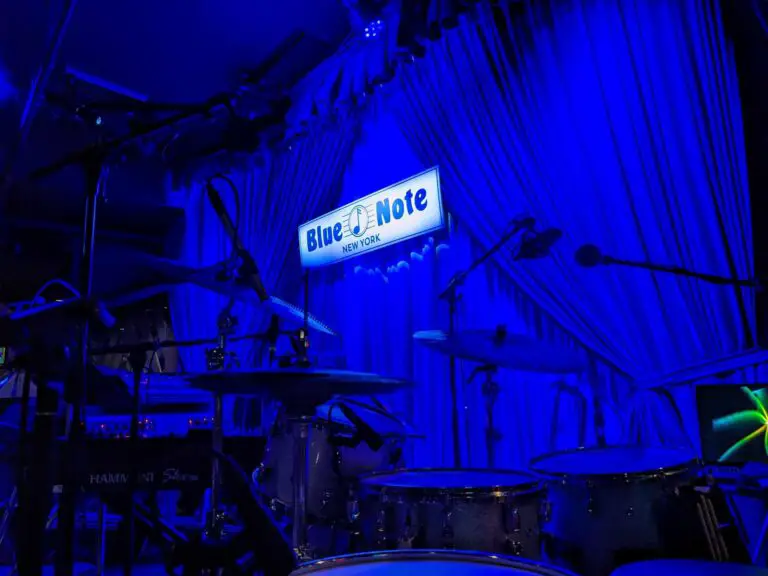Esperanza Spalding, the Portland-born bassist and singer, performed a night of shapeshifting avant-garde jazz at the Blue Note on Wednesday, February 19. The hour-and-a-half set was part of a 12-night, two-show-a-night run at the West Village institution.
At five past the hour the lights dim and the gentle gnawing of Buffalo wings falls to a hush as spalding and her bandmates climb onstage. She closes her eyes and emits a gentle note, the soft crackle in her throat the first trembling foreshocks of what we will hear tonight.

We are hearing a cover of “When You Dream” by Wayne Shorter, and a dreamy opening it is, her voice and the double bass two souls wandering about each other in this dark room.
The concert was cherrypicked from Esperanza Spalding’s absurd discography, spanning Música Popular Brasileira, favorites from the early years and a couple of pieces from her alchemical masterpiece 12 Little Spells.
Next is “Cais” off her recent album with Brazilian legend Milton Nascimento (a cover of the original by Nascimento and Lô Borges). She translates the opening verse into English:
For those who want to let go / I invent the pier / I invent more than loneliness gives me / I invent a new moon to brighten
We were sadly missing Nascimento’s husky, dry-aged voice. But there are silver linings as spalding now has all the space to fully breathe. About halfway through the song, just before its twinkling, teasing little breakdown, she emits a long, high note, a lighthouse beam sweeping the surf, the moon that brightens, her willful hands steering the bass as it gets beaten about in the wash below.
One of the beautiful things about her music is how she layers her own voice. Sadly this impossible here, but the saxophone is a worthy replacement, weaving in and out and around roguishly.
Next is “Thang (Hips)” from 12 Little Spells. Before the song spalding tells us that we all need some “stride grease to loosen up our hip joints.” (Who can disagree in this frigid weather?) As if talent and emotion weren’t enough, Spalding is a natural in front of a crowd.
You sense this that crowdwork isn’t rehearsed, that each of the 24 sets of bodies contorting themselves into the club’s miserly seating over this run will hear some different musing. She somehow finds the energy throughout, alongside singing and playing her bass, to shake and writhe before the microphone.
Live jazz can occasionally sound a little thin, like there’s just not enough substance to make you feel it in the chest. Thankfully tonight the texture from the four members covers so much ground, and so easily: the Hammond with its Americana redolence, the electric guitar with its strange wah wah sounds.
But, at the end of the day, Esperanza Spalding could sing above anything, or nothing, and it would still sound right, and our hips would still feel pretty well lubricated.
For all the talk of prodigious musical talent – talk which she herself has disavowed as misogynistic and patronizing – on stage spalding is living proof that the secret to genius is that you simply have to love it. Really love it. We can sense that, for every minute she spends performing in front of these adoring crowds, there are 10 hours spent in the studio practicing. She probably enjoyed it just as much.
Spalding whips out a five-string fretless bass (presumably wanting to make this as hard as possible for herself; any other way is too boring). She asks her drummer to bring us in to the next tune with a solo, and what he produces is angular and cranky and pulsating. Spalding grins at him over the neck of her bass like a mad professor who’s finally found the secret to eternal life.
Now in her forties, spalding is giving less understated prodigy, more raving genius, seeing and hearing things the rest of us can’t.
Midway through the set Esperanza Spalding brings Fred Hersch to the stage – “Fred Hersch?” an echo whimpers from the back – to tinkle over her as she shows her more vulnerable side. The dinner-and-jazz ambiance of the Blue Note is complete (the shrimp cocktail, I’m told, is limp but satisfying). Hersch doesn’t take his eyes off Spalding throughout, as spellbound as the rest of us by her wild little spells.
This Fred Hersch interlude is over and the band realize they have to cut two songs off the setlist (the Blue Note, it appears, are fastidious timekeepers). So we finish with “Black Gold,” an inspiring pop number to lift us out into the cold night. As I walk out I can’t help but wonder, had she had her full time, which elixir might have poured into my ears; which body part might have run just that little bit smoother?


Comments are closed.